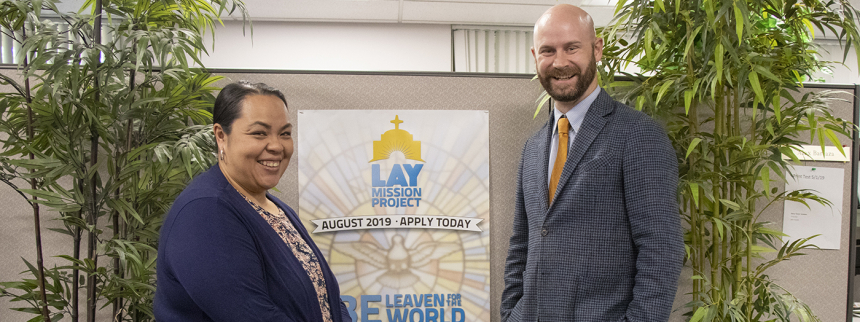
(In photo above, Chris Owens, director of the Office of Family and Faith Formation, discusses the Lay Mission Project with Lauralyn Solano, assistant director for lay formation.)
In Bishop Jaime Soto’s strategic plan announced in 2012, under the priority of formation of the laity, the bishop set a goal of intentionally forming and certifying 500 (400 at the basic level and 100 at the advanced) laypeople for collaboration in the mission of the church, both in internal ministry as well as in evangelizing society.
To reach this goal, the diocese offered several tracks of formation. In 2013, Bishop Soto sought out Dominican Father Michael Sweeney to develop an effective and comprehensive formation for the laity. After three years of development, the Lay Mission Project was launched in August 2016 and to the test with the first cohort of 78 participants. Because of its success, positive feedback and good fruit borne of the first exploratory cohort, the bishop has endorsed implementation of a second cohort which will begin in this fall. Bishop Soto encourages parishioners from every parish in the diocese to participate in this unique and effective formation, says Lauralyn Solano, assistant director for lay formation in the diocese’s Office of Family and Faith Formation.
Partially funded by the ONE Campaign Lay Formation Fund, the Lay Mission Project is a three-year process of formation designed for the laity to delve deeply into the faith and fully live their vocation. The formation process is a hybrid of both online and in-person components. Each year begins in August with an in-person retreat where the whole diocesan cohort is gathered. After the retreat, classes are offered via a media-rich online platform, giving participants the flexibility to fit the lessons into their schedules.
In addition to the online coursework, participants meet in local formation communities every two to three weeks to discuss the material, pray with one another, and discern how to apply – and support one another in applying – what they are learning to their everyday lives. The second half of the year begins in January with an in-person workshop, followed by more courses. Experts present the material in a way that is practical and immediately applicable. For the purpose of effective integration of the material, courses are taken one at a time, and each one builds on the previous.
The first two years provide a fundamental theology in courses on the lay vocation, Scripture, ecclesiology, history, Catholic social teaching, moral theology and sacramental life. The third year facilitates discernment and fruitful dialogue with respect to applying the material to various areas of personal and societal engagement, and covers science, art, law, the political order, business and economy.
The Lay Mission Project is designed “to give life to local communities of intentional disciples of our Lord, help participants see their lives in light of their calling as lay apostles, and equip them to live out their fundamental calling: to transform persons and society through living the faith in all aspects of life,” Lauralyn says.
“There are very few known programs I am aware of like the Lay Mission Project. The diocese is blessed to be the first to offer it. Over the course of formation, participants will come to understand how to live their faith in both secular settings, as well as ministry, should one be called to that also.”
The Lay Mission Project is designed for any parishioner, regardless of current or past ministry experience and involvement. The diocese is currently accepting applications for cohort 2 of the Lay Mission Project, starting in January 2020. To apply, visit www.scd.org/laymission.
For more information, contact Lauralyn at Lsolano@scd.org or 916.733.0153. To learn more about the ONE Campaign funds at work, visit www.onerevival.org.
(In photo above, Chris Owens, director of the Office of Family and Faith Formation, discusses the Lay Mission Project with Lauralyn Solano, assistant director for lay formation.

